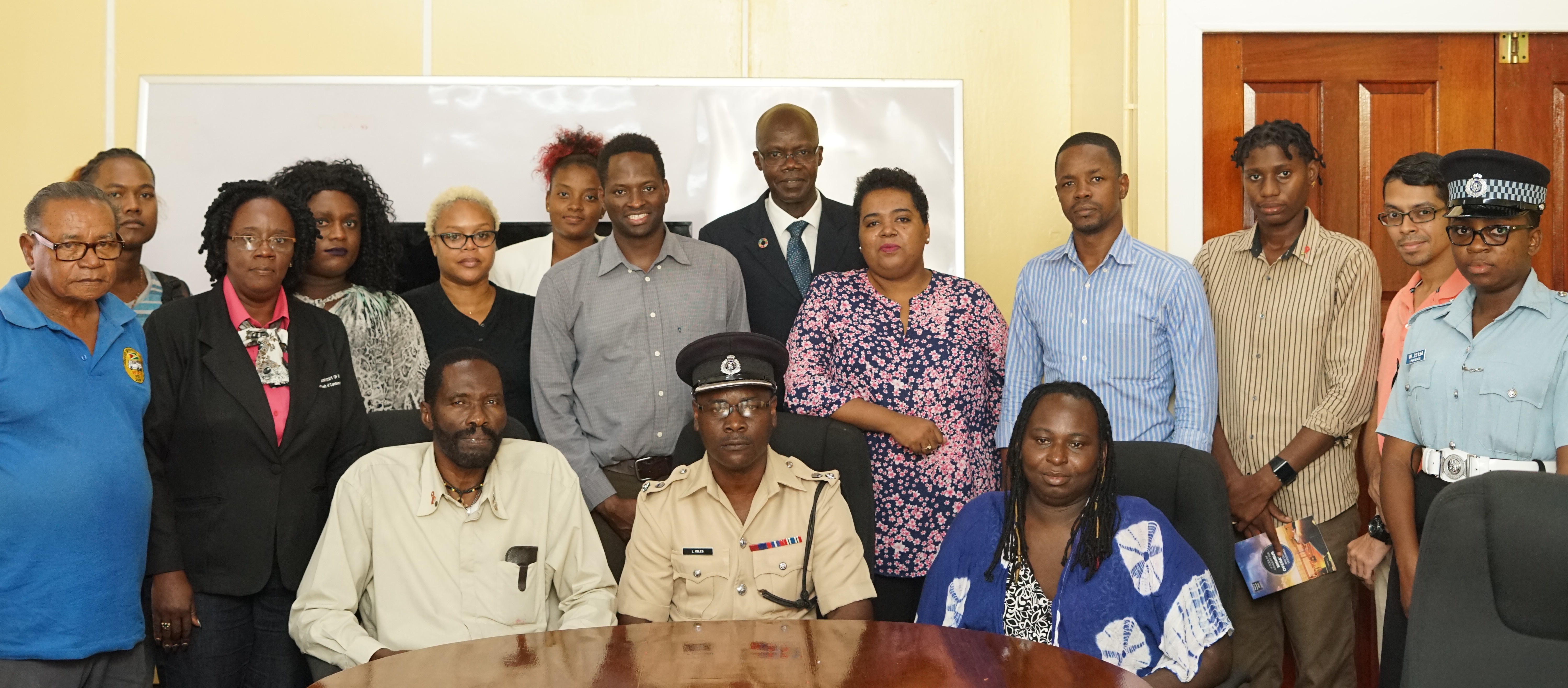
GTU and SASOD mark Transgender Visibility Day with Public Transport Consultation
Image: Participants of the Stakeholder Consultation on Violence and Discrimination in Access to Public Transportation
In observance of International Transgender Day of Visibility, 31 March, the Guyana Trans United (GTU) and the Society Against Sexual Orientation Discrimination (SASOD Guyana) in collaboration with the Ministry of Public Infrastructure hosted a Stakeholder Consultation on Violence and Discrimination in Access to Public Transportation for LGBTQ+ Persons at the Ministry’s Fort Street Kingston board room on Wednesday, 27 March 2019.
The consultation aimed to share information, facilitate dialogue and formulate solutions about the standard of respect and treatment required for all persons utilising public transportation. The meeting discussed the effects of anti-LGBTQ discrimination in accessing public transportation and regulations and solutions aimed at preventing and punishing violence and discrimination against LGBTQ+ persons seeking to utilise public transportation services.
Representatives from the United Mini Bus Union, Ministry of Public Infrastructure, Ministry of Business, Guyana Police Force, UNAIDS, USAID Advancing Partners and Communities Project, GTU and SASOD Guyana were in attendance.
In brief opening remarks, Managing Director of SASOD Guyana, Joel Simpson, noted that the goal of the consultation was to find collective solutions to prevent the violence and discrimination some LGBTQ+ persons, especially transgender persons, suffer when using public transportation. SASOD Guyana’s Human Rights Coordinator, Valini Leitch, pointed out the difficulties some LGBTQ+ persons encounter in accessing public transportation. She stated that discrimination affects access to healthcare, basic needs and has been an ongoing problem, especially for transgender persons who face the brunt of the abuses because of their visibility.
Simpson emphasised that every citizen should be able to access public transportation without fear of violence or discrimination. The problem, he said, is not just limited to mini-buses, but cuts across the local transportation sector, including taxis and speed boats. He also noted the limitations that LGBTQ persons encounter in accessing justice while also pointing out that the Caribbean Court of Justice (CCJ) struck down Guyana’s law against cross-dressing in November 2018.
The Traffic Chief, Senior Superintendent Linden Isles explained that the law is clear on the obligation to carry passengers. He recognised that cases of discrimination do occur and highlighted the importance of reporting swiftly to the police and giving a clear and detailed statement to the police when these infringements arise. Mr Simpson noted that in some cases the traffic ranks do prejudicially take the side of the taxi driver or mini-bus operator. Simpson emphasised the need for sensitising traffic ranks and transport operators.
Muriel Tinnis-Duke, Director of Consumer Affairs at the Ministry of Business, noted that the recently released Code of Conduct for Minibus Operators was prepared with the prevention of all forms of discrimination in mind.
Recognizing gender as a prohibited category of discrimination in the Code of Conduct, Simpson noted that “sexual orientation, gender identity and gender expression” need to be expressly included in the list of grounds in the Code’s nondiscrimination provision. He expressed the need for broader consultations on future iterations of the document.
Clive Williams, Planning Officer at the Ministry of Public Infrastructure’s Central Transport Planning Unit, noted that his Ministry was in full agreement that persons should not suffer any discrimination in accessing public transportation. He emphasised the need to engage transportation bodies to have sensitisation sessions.
In closing, Simpson acknowledged the role of education and expressed interest in further collaborations and bilateral meetings with the other stakeholders at the meeting. He also noted the need for GTU and SASOD Guyana to undertake community education to inform LGBTQ+ persons of their role in the process.
WHAT IS PANCAP?
PANCAP is a Caribbean regional partnership of governments, regional civil society organisations, regional institutions and organisations, bilateral and multilateral agencies and contributing donor partners established on 14 February 2001. PANCAP provides a structured and unified approach to the Caribbean’s response to the HIV epidemic, and coordinates the response through the Caribbean Regional Strategic Framework on HIV and AIDS to maximise efficient use of resources and increase impact, mobilise resources and build the capacity of partners.
What are the Global AIDS Strategy 2021–2026 targets and commitments?
If targets and commitments in the strategy are achieved:
- The number of people who newly acquire HIV will decrease from 1.7 million in 2019 to less than 370 000 by 2025
- The number of people dying from AIDS-related illnesses will decrease from 690 000 in 2019 to less than 250 000 in 2025.
- The goal of eliminating new HIV infections among children will see the number of new HIV infections drop from 150,000 in 2019 to less than 22,000 in 2025.
What are the 95-95-95 Targets for ending AIDS?
- 95% of People Living with HIV know their HIV status;
- 95% of people who know their status on treatment; and
- 95% of people on treatment with suppressed viral loads.
HELPFUL LINKS:
Global AIDS Strategy 2021–2026, End Inequalities, End AIDS
https://pancap.org/pancap-documents/global-aids-strategy-2021-2026-end-inequalities-end-aids/
Caribbean Regional Strategic Framework on HIV and AIDS (CRSF) 2019-2025
https://pancap.org/pancap-documents/caribbean-regional-strategic-framework-2019-2025/
